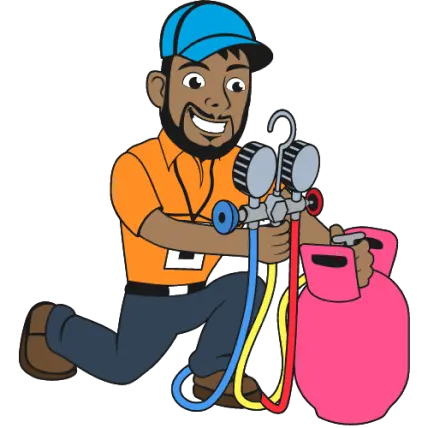There’s no such thing as a “normal” grinding noise from your AC. When your system kicks on and it sounds like metal is chewing metal, something’s gone wrong. Whether it’s a worn-out motor, failing compressor, or something as simple as a loose blade scraping the housing—ignoring the sound is a fast track to major repairs.
In San Antonio’s heat, where your AC runs almost nonstop, even small mechanical issues escalate quickly. Catching that grinding early can mean the difference between a quick fix and a full system replacement.
Common Causes of AC Grinding Noises
Strange sounds are your AC’s way of asking for help—and a grinding sound usually means parts are rubbing or scraping where they shouldn’t. Below are the most common culprits that San Antonio homeowners encounter.
Failing Compressor Components
If you hear the grinding coming from your outdoor unit—especially deep from within—it could be your compressor. Inside, the pistons or valves that pressurize refrigerant can wear out or break over time. When they do, you’ll hear a harsh, internal grinding sound as metal collides with metal.
This isn’t a DIY fix. Compressor repairs often require full replacement of the part—and in some cases, the entire unit. If you suspect this is the issue, turn off the system and call a licensed AC technician right away to avoid further damage.
Worn Out Fan Motor Bearings
Both your outdoor condenser fan and indoor blower rely on smooth-spinning bearings to operate. When those bearings wear out, they start to grind—producing a low, groaning noise that often starts up when the system turns on and continues as the fan spins.
If left unchecked, worn bearings can cause motor failure. In some cases, a few drops of lubrication can quiet the issue—but in sealed or badly worn motors, replacement is often the best option. Comfort Tech can diagnose whether it’s something simple… or something on its last legs.
Bent or Damaged Fan Blades
A grinding noise could be coming from something as basic—but serious—as a bent or cracked fan blade. Whether in the outdoor condenser or indoor blower, a blade that gets out of alignment can scrape against the shroud or housing as it spins, producing a metallic, grinding sound that only worsens with use.
This is especially common after a storm or debris impact. Running the system with a damaged fan risks further destruction—shards can break off and hit coils or motor housings. If you suspect a blade issue, turn off the power and inspect visually. If anything looks off, it’s time to call a professional before the damage spreads.
Debris Lodged in Outdoor Unit
San Antonio yards aren’t shy about blowing leaves, sticks, or even the occasional critter into outdoor AC units. If debris gets wedged between the fan and its housing, you’ll hear a rhythmic grinding or scraping sound when the fan blades strike it.
The fix may be as simple as turning off the power, removing the fan grate, and clearing the obstruction. But even minor jams can stress your fan motor if ignored. If the noise continues after cleanup—or you can’t reach the debris safely—let a technician take it from there.
Loose Parts and Panels
Sometimes, the grinding isn’t from inside the motor or compressor—it’s a loose screw, panel, or support bracket that’s shifted just enough to rub against a moving part. These issues can pop up over time, especially in older units or systems that haven’t had regular tune-ups.
This type of grinding might start off subtle but gets louder and more damaging the longer it’s ignored. A professional inspection can identify and tighten anything that’s out of place before it causes real damage.
DIY Troubleshooting Steps for Homeowners
Not all grinding noises require a major repair—but every one deserves your attention. If you’re hearing a strange sound from your AC, here are a few things you can safely check before calling in the pros.
Turn Off the Power First
Before touching anything, shut off the power to your AC system. This protects both you and your equipment. Locate your outdoor disconnect box or switch off the system from your breaker panel.
Never try to inspect moving parts, fan blades, or electrical components while the system is running. Safety first—always.
Inspect the Outdoor Unit
With the power off, take a look at the outdoor condenser. Is there anything visibly jammed in the fan? Do the blades look bent, chipped, or out of alignment? Try gently turning the fan blades by hand to feel for resistance or scraping.
If something’s clearly stuck or the fan hits anything as it turns, you may be able to clear minor debris yourself. But if parts are bent or the noise persists after clearing it, it’s time to book a repair.
Check the Indoor Blower Fan
Next, open the panel on your indoor unit (air handler or furnace) and locate the blower fan. Look for dust buildup, signs of loose wires, or anything stuck near the wheel.
You can also try spinning the blower wheel by hand—it should rotate freely. A grinding or scraping resistance often means the motor bearings are shot or something’s come loose inside. Don’t attempt to remove or lubricate sealed components—this is where DIY stops and professional repair begins.
Change Air Filters and Clear Vents
A dirty air filter won’t usually cause a grinding noise by itself—but it does put extra strain on your system. When airflow is blocked, motors work harder, components overheat, and stress accumulates in all the wrong places.
Swap out any clogged filters and make sure vents throughout your home are open and unobstructed. This small step often helps improve performance and can reduce stress-related noise, especially in older systems.
When to Stop DIY and Call a Pro
If you’ve cleared debris, replaced filters, and checked for obvious loose parts—but the grinding persists—don’t wait.
Here are your signs it’s time to get professional eyes on the problem:
- Grinding comes from inside the compressor
- Noise continues even after basic cleaning
- You notice burning smells, electrical irregularities, or rattling that worsens during operation
- The system is under warranty and DIY could void coverage
These aren’t fix-it-yourself moments—they’re calls for fast, skilled service.
When to Call a Professional (And Why Sooner Is Cheaper)
The longer you wait, the more damage your system takes. What starts as a bad bearing or jammed blade can burn out motors, seize compressors, or force a full replacement.
San Antonio heat only speeds up the wear. That grinding noise? It’s your AC warning you. Comfort Tech can step in quickly, pinpoint the cause, and stop further damage in its tracks.
What Happens If You Ignore the Grinding?
Brushing off that grinding noise might feel harmless—until your system breaks down in the middle of a Texas heatwave. Here’s what you risk by letting it ride:
Burned-Out Motors or Bearings
What starts as a gritty noise from worn bearings can quickly turn into a seized motor. The extra friction generates heat, stresses components, and leads to complete failure. Instead of a simple fix, you’re now facing a motor replacement—and sweating until it’s done.
Shattered Blades or Debris Damage
If a bent blade keeps spinning, it could snap off entirely. When that happens, broken metal can puncture coils, damage housings, or take out the fan motor itself. Even a small jam from debris can do real harm if it’s left to grind away.
Total Compressor Failure
Grinding from the compressor is one of the most serious red flags. Internal failure inside this component often means the entire compressor needs to be replaced. And since this is one of the most expensive parts of your system, it’s a repair best avoided.
Why Routine AC Maintenance Prevents These Issues
Grinding noises don’t usually come out of nowhere—they build up over time as parts wear down or debris goes unnoticed. That’s why regular maintenance isn’t a luxury—it’s protection.
During a Comfort Tech tune-up, we:
- Inspect and clean condenser and blower components
- Lubricate motors and bearings (when applicable)
- Check and tighten fan blades, mounts, and panels
- Spot early wear before it becomes a breakdown
In San Antonio’s heat, AC systems work harder and wear faster. Keeping yours in top shape prevents surprise failures and saves you money in the long run.
Grinding Sound? Comfort Tech Can Fix It Fast
Grinding AC noise? Don’t wait—schedule expert service today.
Comfort Tech’s licensed techs diagnose and repair grinding issues before they turn into system replacements. We serve homeowners across San Antonio with fast, professional AC repair you can trust.
[ Call Now: (210) 920-4645]
FAQ
- Is it safe to run my AC if it’s making a grinding noise?
No—grinding means something is failing. Continued use can damage motors, blades, or even the compressor.
- Can I fix a grinding noise myself?
You can check for debris, change filters, and inspect for loose parts. But if the noise persists or comes from the compressor or blower motor, call a pro.
- How much does it cost to fix a compressor grinding noise?
Costs vary, but compressor replacement is among the most expensive AC repairs. Early diagnosis can often prevent needing a full replacement.
- What kind of maintenance helps prevent this?
Annual AC tune-ups help prevent grinding by catching loose parts, lubricating bearings, and clearing debris before damage occurs.
Stay Cool and Quiet With Expert AC Repair
A grinding AC isn’t something to ignore. Whether it’s a worn fan, bad bearing, or something deeper—Comfort Tech is ready to help. We serve San Antonio homeowners with prompt, expert repairs that get your system quiet, cool, and running right again.
Need help now? Don’t let the problem grow—[Call Comfort Tech today].





